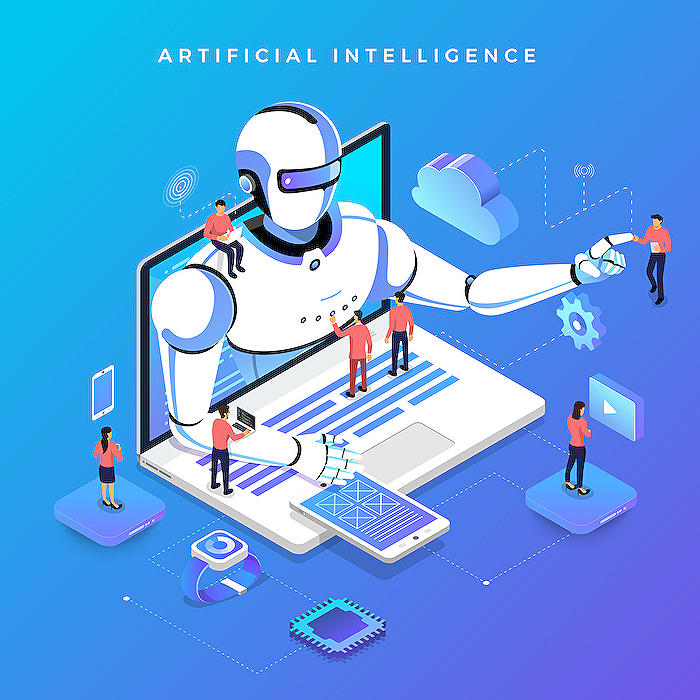- All of Microsoft
Beginners Guide to Genta Generative AI-based RPA
Unlock the power of generative AI and robotic process automation with Genta Automation- your one-stop solution for seamless operations.
Artificial Intelligence and Robotic Process Automation: A Detailed Analysis
AI-powered (Artificial Intelligence) automation tools have been gaining popularity for their role in digital transformations. Among these tools, Genta Automation has emerged to the forefront. Combining Computer Vision, AI, and Chat GPT, Genta Automation is paving the way for the use of simple language in the automation of websites, systems and excel operations.
Genta's software combines AI and Robotic Process Automation (RPA) - two major digital transformation tools projected to excel in the forthcoming years. The global RPA market itself is expected to reach $11 billion by 2027, while generative AI is predicted to contribute an annual $2.6 trillion to 63 practical use cases.
These technologies are proving invaluable to businesses due to their broad capabilities. On one hand, RPA can automate repetitive tasks, allowing workers to dedicate more time to higher value tasks; generative AI on the other hand pushes the boundaries of automation by creating original content. Further information on AI and RPA can be found here.
Understanding the Efficiency of These Technologies
Generative AI can efficiently support RPA development by addressing the 'blank canvas' problem - a familiarity for software developers unsure of where to begin when designing a program from scratch, especially where complex logic or error-handling requirements are considered.
Utilizing Python, generative AI can facilitate automation by translating high-level descriptions into functional codes. The open-sourced nature and wide availability of Python proves critical for AI and automation delivery.
Here is a look at some key use cases of generative AI and RPA:
- Customer Service: Automated workflows can aid in information collection, database updates and scheduling follow-ups. Simultaneously, personalized responses to customer queries can be created by Generative AI models.
- Marketing & Advertising: RPA eases some processes like collection of customer data or scheduling marketing campaigns. Additionally, personalized content can be created using generative AI tools.
- Healthcare: Administrative tasks like scheduling appointments, maintaining patient records, or processing insurance claims can be automated using RPA. Generative AI can create synthetic patient data for research.
- Financial Services: Compliance reporting, loan processing and data entry can be automated using RPA in the financial sector. However, generative AI can generate potential financial scenarios for risk modeling or provide personalized financial advice to customers.
It is clear that these technologies provide a wide array of automation opportunities across various sectors. They hold the potential revolutionize sectors with their cutting-edge digital transformation capabilities.
Conclusion
In conclusion, Genta Automation provides a unique blend of RPA and AI technology to enable a wide range of automation possibilities. The use of everyday language to automate websites, systems, and excel operations is a revolutionary development in the evolving digital landscape. With the rapidly progressing digital transformation wave, the adoption of these transformative technologies is becoming essential for businesses to stay, sustainable, efficient and competitive.

Learn about Generative AI-based RPA
The video guide examines an AI-based RPA tool: Genta Automation. Its ground-breaking technologies, namely Computer Vision, AI, and ChatGPT, allow it to convert everyday conversations into automation scripts. Becoming proficient in this transformative technology requires an understanding of similar advanced tools such as Robotic Process Automation (RPA) and generative AI and their impact on various sectors.
RPA and generative AI play instrumental roles in the digital transformation landscape owing to their extensive capabilities. While RPA tends to repetitive tasks freeing up employees to focus on strategic tasks, generative AI facilitates the creation of original content. These dynamic tools contribute to enhancing operational efficiency within organizations; thus, they are seen as revolutionary rather than temporary trends.
This video targets business leaders who seek insights before investing in these tools and RPA developers who want to speed up their programming process. In this regard, generative AI comes in handy by tackling the "blank canvas problem". With a high-level description of the desired outcome, the AI model can generate functional codes, thereby simplifying and expediting the programming process.
Generative AI also finds its application in RPA bots in many industries including:
Customer Service: RPA bots are used to automate customer information collection, database update, and follow-up scheduling. Customer response personalization is achieved using Generative AI models.
- Marketing and advertising: RPA can automate parts of marketing while generative data learning tools help create personalized content.
- Product development & designs: Here, RPA creates automated workflows for data collection, project management, and inventory management. Generative AI enables companies to prototype and innovate rapidly.
- Data analytics & management: RPA gathers and preprocesses data whereas synthetic data can be generated by generative AI.
- Healthcare: Administrative tasks can be automated by RPA and generative AI can create synthetic patient data.
In the finance sector, generative AI creates potential financial scenarios and offers personalized advice while RPA takes care of data entry, compliance reporting, and due diligence tasks, notably enhancing overall efficiency.
To sum up, this Genta Automation Guide video is a powerful resource to get acquainted with RPA and generative AI, the future technologies influencing various fields. It acquaints the viewer with the working procedures of these technologies, their applications, and their transformative potential. Regardless of whether you're a business leader considering investing in automation or an RPA developer looking to expedite your programming process, this resource serves as a comprehensive guide to the subject matter.
Keywords
Genta Automation Beginners, RPA Introduction, Generative AI, RPA Tutorial, Genta AI Guide, Robotic Process Automation Basics, Genta RPA Training, AI-based RPA, Generative Artificial Intelligence, Beginners Guide RPA
